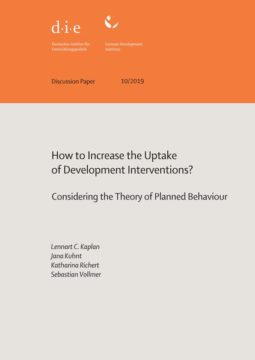A crucial prerequisite for the success of development interventions is their uptake by the targeted population. We use the set-up of interventions conducted in Indonesia and Pakistan to investigate dis-/incentivising factors for a programme’s uptake and support. Making use of a framework grounded on psychological theory – The Theory of Planned Behaviour – we consider three determinants for intervention uptake: personal attitudes; subjective norms (influenced by important others); and the perceived ease of performing the desired behaviour. As most development interventions are characterised by a cooperation between local and international agents, we investigate a potentially important dis-/incentivising factor further: the salience of the implementer’s background.
Our findings show that attitudes, subjective norms, and ease of use are indeed associated with increased uptake in our two culturally different settings. Conducting a framed field experiment in Indonesia, we go on to show that the study population in the Acehnese context exhibits higher levels of support for the project if the participation of international actors is highlighted. We find that previous experience with the respective actor is pivotal. To strengthen supportive behaviour by the target population for locally led projects, it is essential to foster local capabilities to create positive experiences.
Hence, our results encourage development research and cooperation, first, to consider personal attitudes, subjective norms, and the perceived ease of use in the design of interventions in order to increase uptake. Second, and depending on the country context, implementers should consider previous experience with and attitude towards partners – either local or international – when aiming to achieve behavioural change.
- Veröffentlicht am Freitag 25. Oktober 2024 von Deutsches Institut f. Entwicklungspolitik
- ISBN: 9783960211006
- 46 Seiten
- Genre: Gesellschaft, Politik, Sachbücher, Wirtschaft
